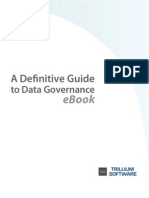Accenture MDM Foundations
Accenture MDM Foundations
Uploaded by
Vasco MonteiroCopyright:
Available Formats
Accenture MDM Foundations
Accenture MDM Foundations
Uploaded by
Vasco MonteiroCopyright
Available Formats
Share this document
Did you find this document useful?
Is this content inappropriate?
Copyright:
Available Formats
Accenture MDM Foundations
Accenture MDM Foundations
Uploaded by
Vasco MonteiroCopyright:
Available Formats
Point of View
Foundations First
Building Master Data Management Capabilities
to Achieve High Performance
Ever experienced the frustration of
searching for information you know
you have but cannot find? Perhaps
your data is in too many places. In
an Accenture survey
1
, 34 percent of
respondents report that they do not
manage master data much beyond
individual systems.
However, inconsistent, inaccurate
or inaccessible information could
make the difference between
keeping pace with the competition
and losing market share.
Master data management is a set of processes
to create and maintain a single view of customer,
product or other core reference data that is
shared across systems. It is multidisciplinary in
nature, involving business process analysis, data
profiling, data cleansing, data consolidation
and reconciliation, data migration and data
governance. It is fairly static in nature, acting
as the foundation for a better information
management strategy.
For executives seeking instant access
to high-quality information, sharing,
classifying and defining data is
essential. Accenture believes master
data management could be the answer
for organizations seeking agility and
high performance.
Why master data management?
Master data management is not a
quick fix or another application layer
to maintain; it is the bedrock for
successful analytics and operational
initiatives. Why does this matter?
Because CIOs responding to a recent
survey indicated they are serious about
managing their information.
Responses to our survey, Cultivating
High Performance through Information
Management, Accenture 2007,
highlight that organizations are:
Targeting an overall information
management strategy (75 percent
of organizations want to have
comprehensive, enterprise-wide
information management in three
years time).
Investing in information
management to help them
outperform the competition,
rather than merely helping
them stay in the game.
Recognizing the value that effective
information management brings to
their business.
What is more, 98 percent of
respondents expressed the need to
have, at a minimum, an organized
master data management and sharing
program in place for key data.
Despite this vote of confidence
from CIOs, Accenture has found that
many organizations, hampered by a
misconception of complexity, are slow
to capitalize on the underpinning
qualities of master data management.
In seeking value, large organizations
with multiple lines of business may
have taken the route recommended
by systems integrators, solution
providers and product vendors for
a single tool or solution deployment.
Adopting such an approach has often
failed to produce effective results,
possibly due to a silver bullet
mentality that was unlikely to ever
reap rewards. Other organizations,
uncertain where to start, may have
dabbled with a single master data
attribute (such as customer or
product data) but become
disheartened that the benefits
appeared to dwindle in the mid to
long term. Unsurprisingly, the true
benefits are to be found when two
or more attributes are combined,
for example, when customer data
is aligned with product or location
information and similarly when
product data is aligned with vendor
information.
Whatever the reasons for hesitation,
Accenture believes it is a case of
better late than never for master
data management. In our experience,
just as you cannot build a house
without a foundation, so master data
management is a vital component of
an effective information management
strategy. Master data management
provides a single source of the truth,
enabled through business process
management and data quality
tools and technologies, to realize
untold value.
Delivering high performance
Master data management, although
simple and cost-effective, does require
planning and a holistic approach.
Organizations on the path to high
performance also need to consider:
Metadata managementorganizes
the data and information related
to the data. Metadata management
focuses on the documentation aspect
of the analytics program, typically
providing business, operational and
technical metadatacritical detail
across every aspect of the
organization.
Data governancethe long-term
viability of a large-scale data vision
is dependent upon an organization
successfully handling the dynamics
(people and processes) attributed
to data governance.
A solid platform for growth
Effective master data management
uses fewer resources, centralizes data,
improves customer experiences and
increases overall efficiencies to foster
success and growth. Purchasing
decisions are driven by so many
factors, but with todays constant
bombardment of information, being
able to understand buying preferences
to effectively target and retain
customers is essential. From the
consumers viewpoint, lack of time and
desire for choice are key elements in
decision makingand consumers are
fully prepared to use digital channels
to ensure they get the best price.
Master data management can
positively benefit an organizations
ability to accelerate more agile,
flexible systems such as embracing
a systems-oriented architecture
approach. What is more, with
information scattered across a
number of different sources, a holistic
solution saves time in the short term
and positions organizations
competitively in the long term.
In this way, rather than spending
time looking in multiple places for
elusive information, organizations can
focus on achieving high performance.
Mastering data for high
performance
A leading multinational chemical
company invited Accenture to
help it implement a master data
management strategy. The strategy
included a widely supported business
case, solution architecture, legacy
retirement plan and comprehensive
five-year phased project
implementation plan. The company
standardized and streamlined
operations to provide a single source
of truth for all applications, optimize
and enhance productivity by using
key enterprise data and improve
sourcing decision making and costs.
The resulting aggregate customer
information placed them in a strong
position to not only achieve high
performance through revenue
growth but also improve profitability
by reducing manual effort and
the costs of customer contact.
Efficiency is now improved because
the companys customer service team
members have single entry, accurate
and complete customer data while
also having access to a role-specific
task inbox and notifications of
workflow status. Management has
insight into point-in-time intelligence
on all ongoing customer projects,
which improves their ability to act
in a timely manner and make more
informed decisions. The company is
now effectively managing credit risk
and freeing up cash for additional
energy transactions. The solution has
resulted in a significant increase in
data integrity across multiple data
stores, lower data errors due to a
single record of reference, faster
time to bill with increased invoice
accuracy and simpler communication
between workgroups. The flexible
and standardized data model within
the solution gives this chemical
company a platform for greater
harmonization with other
organization-wide master
data initiatives.
A global petroleum company
operating in more than 100 countries
had master data spread across more
than six transaction platformseach
supporting business units and teams
with their own terminology, code
sets, processes and demand for the
same data elements. Redundant
customer data entry, manual handoffs
between teams and minimal system
controls for validating data accuracy
significantly increased the companys
risk of data corruption, transaction
errors and, ultimately, collections and
credit exposure. Also, unstructured
data governance together with the
lack of a consolidated view of
customer master data, limited the
companys flexibility to provide
fast, competitive customer service.
Accenture developed a two-phased
program to clean the data to
eliminate incomplete, incorrect and
inconsistent entries and used portal-
based workflows to reduce 100
business processes down to 23 core
variations. With quality data and
processes defined, master data
management was deployed as the
data repository to enable, simplify
and streamline the new business
processes.
Checklist for master data
management
Do you have an information
management strategy?
Are you challenged by where
to start with master data
management?
Is master data management a part
of your information management
strategy?
Are you running more than one
master data management program
or project?
Does your data warehouse have
any quality or inconsistency issues?
Are you calculating the return
on investment or total cost of
ownership for your master data
management program?
Are you experiencing challenges in
realizing value from your existing
master data management program?
1
Cultivating high performance through
information management: Data management
and architecture, Accenture 2007
Copyright 2009 Accenture
All rights reserved.
Accenture, its logo, and
High Performance Delivered
are trademarks of Accenture.
For more information on how
Accenture can help your organization
use master data management to
achieve high performance, visit
www.accenture.com/mdm
About Accenture
Accenture is a global management
consulting, technology services and
outsourcing company. Combining
unparalleled experience, comprehensive
capabilities across all industries and
business functions, and extensive
research on the worlds most successful
companies, Accenture collaborates
with clients to help them become
high-performance businesses and
governments. With more than 180,000
people serving clients in over 120
countries, the company generated net
revenues of US$23.39billion for the
fiscal year ended Aug. 31, 2008. Its
home page is www.accenture.com.
About Accenture
Information
Management Services
Accenture Information Management
Services is a global cross-industry
organization focused on bringing
clients solutions to better manage
their business, interact with customers
and make strategic, financial and
operational decisions. Working across
Accentures service lines and industry
groups, this network of 16,000
professionals specializes in information
management services including
business intelligence and analytics,
portals and content management and
data management and architecture.
For more information about Accenture
Information Management Services,
visit www.accenture.com/information
management.
You might also like
- Data Governance PlaybookDocument168 pagesData Governance PlaybookVinh Tran100% (15)
- Giraffe™ Shuttle: Service ManualDocument162 pagesGiraffe™ Shuttle: Service ManualRajasekhar ReddyNo ratings yet
- Data Quality RemediationDocument9 pagesData Quality RemediationXavier Martinez Ruiz50% (2)
- Data Strategy Template v1 2Document13 pagesData Strategy Template v1 2gruntn100% (4)
- The IBM Data Governance Unified Process: Driving Business Value with IBM Software and Best PracticesFrom EverandThe IBM Data Governance Unified Process: Driving Business Value with IBM Software and Best PracticesRating: 4 out of 5 stars4/5 (1)
- Data Governance Ebook FinalDocument56 pagesData Governance Ebook FinalTodd Henley100% (4)
- Sas Data Governance Framework 107325Document12 pagesSas Data Governance Framework 107325Daniel Softjoy MontjoyNo ratings yet
- IBM - Data Governance Council - Maturity ModelDocument16 pagesIBM - Data Governance Council - Maturity Modelajulien100% (3)
- Designing Data GovernanceDocument5 pagesDesigning Data GovernanceJose Andres Mayorga Isler100% (2)
- Master Data Management Strategy - SharedDocument11 pagesMaster Data Management Strategy - SharedElliot_Daly_4467100% (1)
- Data Governance For Master Data Management PDFDocument16 pagesData Governance For Master Data Management PDFDaniel Aderhold100% (4)
- Data Strategy TemplateDocument18 pagesData Strategy TemplateGuillermo Solis67% (3)
- Data Quality Management Best PracticesDocument9 pagesData Quality Management Best Practicesselinasimpson2201No ratings yet
- Maturity Model For Data GovernanceDocument4 pagesMaturity Model For Data GovernanceAbrahamNdewingo100% (1)
- Best Practices - Customer Data Quality ManagementDocument10 pagesBest Practices - Customer Data Quality Managementfakharimran100% (1)
- An Introduction To Data StrategyDocument8 pagesAn Introduction To Data StrategyLuis Lopez100% (3)
- Data Governance Implementation Service Offering 2239Document6 pagesData Governance Implementation Service Offering 2239hojjatNo ratings yet
- 01 Develop A Master Data Management Strategy and Roadmap Executive BriefDocument24 pages01 Develop A Master Data Management Strategy and Roadmap Executive BriefMARIA SELES TELES SOUSANo ratings yet
- Enterprise Data Office PoVDocument10 pagesEnterprise Data Office PoVmallekrishna123No ratings yet
- Big Data StrategyDocument5 pagesBig Data Strategyswayambhu0000% (1)
- Defining A Data StrategyDocument9 pagesDefining A Data Strategymallekrishna123No ratings yet
- Data Catalog StrategyDocument30 pagesData Catalog Strategysolaluaji100% (1)
- Data Strategy Worksheet: Component Typical QuestionsDocument2 pagesData Strategy Worksheet: Component Typical QuestionswaleedNo ratings yet
- Data Governance Trends For 2020Document3 pagesData Governance Trends For 2020fabitcorpNo ratings yet
- Taking Data Quality To The Enterprise Through Data GovernanceDocument28 pagesTaking Data Quality To The Enterprise Through Data Governancekvnumashankar100% (1)
- Global ServicesDocument15 pagesGlobal Servicesparth_upadhyay_1No ratings yet
- The 5 Ways Modern Data Governance Helps Business ProductivityDocument12 pagesThe 5 Ways Modern Data Governance Helps Business ProductivityCarolinaJiménez100% (1)
- Creating An Enterprise Data Strategy - FinalDocument42 pagesCreating An Enterprise Data Strategy - Finalconsultunnikrishnan1850100% (3)
- Enterprise Data Strategy2Document59 pagesEnterprise Data Strategy2sabashsabashNo ratings yet
- Implementing A Data Governance Program - Chalker 2014 PDFDocument22 pagesImplementing A Data Governance Program - Chalker 2014 PDFChristen Castillo100% (2)
- Title The 5 Essential Components of A Data Strategy: White PaperDocument16 pagesTitle The 5 Essential Components of A Data Strategy: White PapergpppNo ratings yet
- Identifying Master DataDocument8 pagesIdentifying Master DatadesijnkNo ratings yet
- Data Management vs. Data Governance - Why You Need Both - DataGalaxyDocument10 pagesData Management vs. Data Governance - Why You Need Both - DataGalaxyjose albertNo ratings yet
- Data Governance Good Practices PDFDocument8 pagesData Governance Good Practices PDFTYNo ratings yet
- Data & Analytics Maturity Model & Business ImpactDocument28 pagesData & Analytics Maturity Model & Business Impactlana_wiajya100% (1)
- Accenture-Chief Data OfficerDocument17 pagesAccenture-Chief Data OfficerVasco LimaNo ratings yet
- Effective Data Governance PDFDocument8 pagesEffective Data Governance PDFNoorAhmed100% (1)
- Data Profiling White Paper1003-FinalDocument17 pagesData Profiling White Paper1003-FinalzipzapdhoomNo ratings yet
- Finservices Data GovernanceDocument1 pageFinservices Data Governancexxcarxx100% (1)
- DCAM Framework Training - Opening Presentation - v3.3.1 - MASTERDocument62 pagesDCAM Framework Training - Opening Presentation - v3.3.1 - MASTERetsygiftsinfoNo ratings yet
- Data Governance IntroDocument10 pagesData Governance IntroRobert QuinnNo ratings yet
- What Is A Chief Data OfficerDocument9 pagesWhat Is A Chief Data Officerrajgopalv2No ratings yet
- Enterprise Data Strategy1Document6 pagesEnterprise Data Strategy1sabashsabashNo ratings yet
- Designing A Data Governance Framework PDFDocument22 pagesDesigning A Data Governance Framework PDFashishkumar777100% (1)
- Data Culture PlaybookDocument10 pagesData Culture PlaybookThe ONE100% (1)
- How To Become A: Data Governance ExpertDocument18 pagesHow To Become A: Data Governance Expertrutger mcgeekNo ratings yet
- Success Stories in Building A Global Data Strategy: Donna BurbankDocument39 pagesSuccess Stories in Building A Global Data Strategy: Donna BurbankSyed MisbahNo ratings yet
- Data Governance WorkbookDocument36 pagesData Governance WorkbookEvrim AY100% (1)
- MD 7257a-18 Data Strategy White PaperDocument9 pagesMD 7257a-18 Data Strategy White PaperrshariefNo ratings yet
- Data Governance: Building A Framework For MDMDocument27 pagesData Governance: Building A Framework For MDMdesijnk86% (7)
- A Complete Set of Data Governance Roles & ResponsibilitiesDocument50 pagesA Complete Set of Data Governance Roles & ResponsibilitiesUmar Iqbal100% (2)
- Role of Data GovernanceDocument12 pagesRole of Data GovernanceAlberto HayekNo ratings yet
- The Forrester Wave™ - Enterprise Data Catalogs For DataOps, Q2 2022Document12 pagesThe Forrester Wave™ - Enterprise Data Catalogs For DataOps, Q2 2022Yann VincentNo ratings yet
- DataGovernancePrimer Hosch 2018-11-04Document70 pagesDataGovernancePrimer Hosch 2018-11-04Mindi Isaacson100% (1)
- Enterprise MDM SupplementDocument86 pagesEnterprise MDM Supplementnira5050No ratings yet
- Data Governance Is Valuable Moving To An Offensive Strategy Alation Whitepaper 2Document13 pagesData Governance Is Valuable Moving To An Offensive Strategy Alation Whitepaper 2Marco BrittesNo ratings yet
- Modern Data Strategy 1664949335Document39 pagesModern Data Strategy 1664949335Dao Nguyen100% (2)
- Data Quality Assessment HandbookDocument23 pagesData Quality Assessment HandbookSimon100% (1)
- Dataversity - Data Quality - 20210826Document32 pagesDataversity - Data Quality - 20210826Eric Lodeve100% (2)
- Data Fabric Architecture (High Level) - Version 1.0Document2 pagesData Fabric Architecture (High Level) - Version 1.0kpalanivel123100% (1)
- Daily Star Sunday (15 Dec 2019)Document104 pagesDaily Star Sunday (15 Dec 2019)Strontium EtheriumNo ratings yet
- FTC4 CHAPTER 4 Components of Special and Inclusive EducationDocument32 pagesFTC4 CHAPTER 4 Components of Special and Inclusive EducationKaren CaballesNo ratings yet
- Megan Kaderbek: Objective EducationDocument1 pageMegan Kaderbek: Objective Educationapi-352941840No ratings yet
- Moses Farrell J.F: SeniorhighschoolstudentsDocument1 pageMoses Farrell J.F: Seniorhighschoolstudentsmoses farrellNo ratings yet
- Wagner 2015Document15 pagesWagner 2015Ana NurfaizahNo ratings yet
- Heart Ring: of TheDocument6 pagesHeart Ring: of TherebeccaNo ratings yet
- IUS or Menorrhagia PathwayDocument1 pageIUS or Menorrhagia Pathwayelmhamnr20No ratings yet
- NCP For Case Presentation (Acute Pain, Episiotomy)Document3 pagesNCP For Case Presentation (Acute Pain, Episiotomy)Jenny Ajoc100% (2)
- Fall Armyworm: WWW - Moccae.gov - AeDocument6 pagesFall Armyworm: WWW - Moccae.gov - AeaiktiplarNo ratings yet
- The Characteristics of Successful Speaking ActivityDocument12 pagesThe Characteristics of Successful Speaking Activitypiyada.da64No ratings yet
- Answer To Letters of ComplaintDocument4 pagesAnswer To Letters of ComplaintAnna SartoriNo ratings yet
- Introduction To Human Settlement PlanningDocument25 pagesIntroduction To Human Settlement PlanningVarun H Rao100% (1)
- Module 6Document5 pagesModule 6Mi CahNo ratings yet
- Sacks MindseyeDocument12 pagesSacks MindseyeЮра ВасильковNo ratings yet
- (ELECS2) Exp3 - Darlington and Cascode Amplifier CircuitsDocument17 pages(ELECS2) Exp3 - Darlington and Cascode Amplifier CircuitsFrodolfre Reginald Lazo100% (2)
- Contact Management System Report NewDocument7 pagesContact Management System Report Newsuchanmadhikarmi123No ratings yet
- Ffwe WRWRDocument1 pageFfwe WRWRjohn jajaNo ratings yet
- ANECO Brownout Schedule Feb25 March23Document68 pagesANECO Brownout Schedule Feb25 March23Jerry HalibasNo ratings yet
- British English Vs American EnglishDocument3 pagesBritish English Vs American EnglishNatércia OliveiraNo ratings yet
- Alpha 630A.Document5 pagesAlpha 630A.Xiao MiNo ratings yet
- Raw DataDocument8,292 pagesRaw DataJose Carlos Mejia CastroNo ratings yet
- Full Chapter Frank Woods Business Accounting 13Th Edition Alan Sangster PDFDocument53 pagesFull Chapter Frank Woods Business Accounting 13Th Edition Alan Sangster PDFjeffrey.leach319100% (14)
- Exam ReviewerDocument10 pagesExam ReviewerAylaNo ratings yet
- ORAL COMMUNICATION (Fundamentals of Public Speaking)Document6 pagesORAL COMMUNICATION (Fundamentals of Public Speaking)Love LoveNo ratings yet
- Potassium-Chloride-Intravenous ANMF1.0 20201208Document5 pagesPotassium-Chloride-Intravenous ANMF1.0 20201208aldyNo ratings yet
- Photograpy Contest & Exhibition RulesDocument2 pagesPhotograpy Contest & Exhibition RulesSudhanwaShingareyNo ratings yet
- Strokescenarioinindia Isp 170727022013Document10 pagesStrokescenarioinindia Isp 170727022013Ajjugal SushmajaNo ratings yet
- Chapter 1Document7 pagesChapter 1camerogabriel5No ratings yet
- Unit 3 Classical Theory of Employment.Document54 pagesUnit 3 Classical Theory of Employment.Anshumaan PatroNo ratings yet

























































































